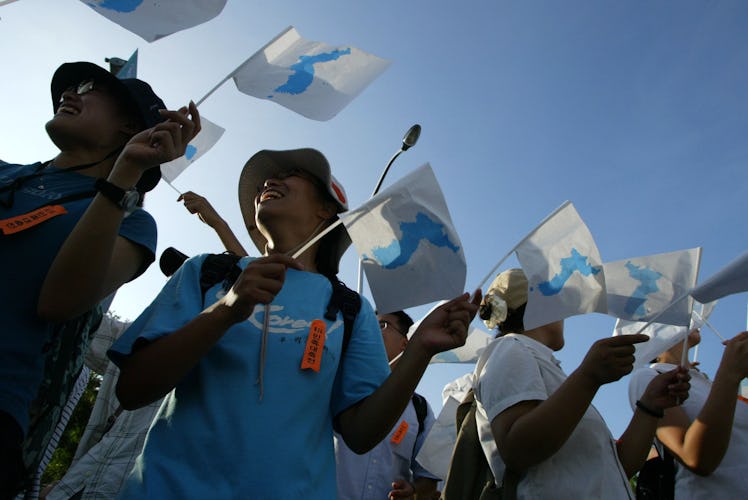
North & South Korea Are Marching Together At The Olympics Under This Unique Flag
It was pretty shocking when North Korea decided to attend this year's Winter Olympics, seeing as though the event is held in South Korea and both territories have a long-existing opposition to one another. But the latest news might even be more surprising: North and South Korea will be marching under the Korean Unification Flag at the 2018 Olympics during its opening ceremony. Together. What makes the motion all the more special is the rich history of the Korean flag.
The flag, which features a blue silhouette of the Korean peninsula and surrounding islands on a white background, has previously been used by North and South Korea to show unity. Both countries marched under the flag for the first time in 1991 at the World Trade Tennis Championships and at multiple events since, according to CNN. However, it hasn't been used since the 2007 Asian Winter Games in Changchun, China, when tensions began to escalate due to issues among the North and South's then-presidents Lee Myung-bak and Park Geun-hye, so it's nice to see them finally get it together.
But not everyone is too thrilled about the motion.
The Japanese government is reportedly protesting the use of the flag during the PyeongChang games due to its inclusion of a set of "disputed islands," according to Yahoo. The group of islands, known as Dokdo in Korean and Takeshima in Japanese, are controlled by South Korea, but claimed by Tokyo. When speaking to reporters on Feb. 5, Japanese Chief Cabinet Secretary Yoshihide Suga stated that using the flag would be "extremely regrettable." He said, "The flag is unacceptable, based on our stance on our sovereignty of Takeshima," and added, "We lodged a protest strongly insisting on our stance through diplomatic channels to South Korea."
The move is the latest step to lower tensions between North and South Korea.
Though some are upset by the countries' plans to march together during the Winter Olympics' opening ceremony, it's simply one of many recent strides to bridge divides between the territories. In the past, the territories have fought tirelessly over North Korea's persistence to develop nuclear programs (against the wishes of South Korea). The North has also been in a continuous feud with the United States in the past few months, especially under President Donald Trump, so it's good to see things running smoothly — for now at least. According to CNN, the North and South have even agreed to form a joint women's ice hockey team to compete at the event.
In addition to that, North Korea is also planning to send a group of 230 supporters to support athletes at the PyeongChang games. On Jan. 1, North Korean President Kim Jung-un announced his decision during his annual New Year's address. He said,
Above all, we must ease the acute military tensions between the North and the South ... The North and the South should no longer do anything that would aggravate the situation, and must exert efforts to ease military tensions and create a peaceful environment.
When speaking about the decision during a briefing, Steven Goldstein — a secretary at the U.S. State Department, which oversees American diplomacy — said,
North Korea is sending an officially recognized delegation of athletes, fans, and support staff to the 23rd Olympic Winter Games, to be hosted by South Korea in Pyeongchang next month. We are confident the Republic of Korea will host a safe, secure, and successful Winter Games. Anything that lowers tensions on the Korean Peninsula is a positive development. We’re in close consultation with the Republic of Korea to ensure North Korea’s participation in the Olympics does not violate UN Security Council sanctions, and I’ll be happy to answer any questions regarding that.
We're not too sure what's going to happen with Japan's protest, but, as North and South Korea are basically saying, can't we all just get along?